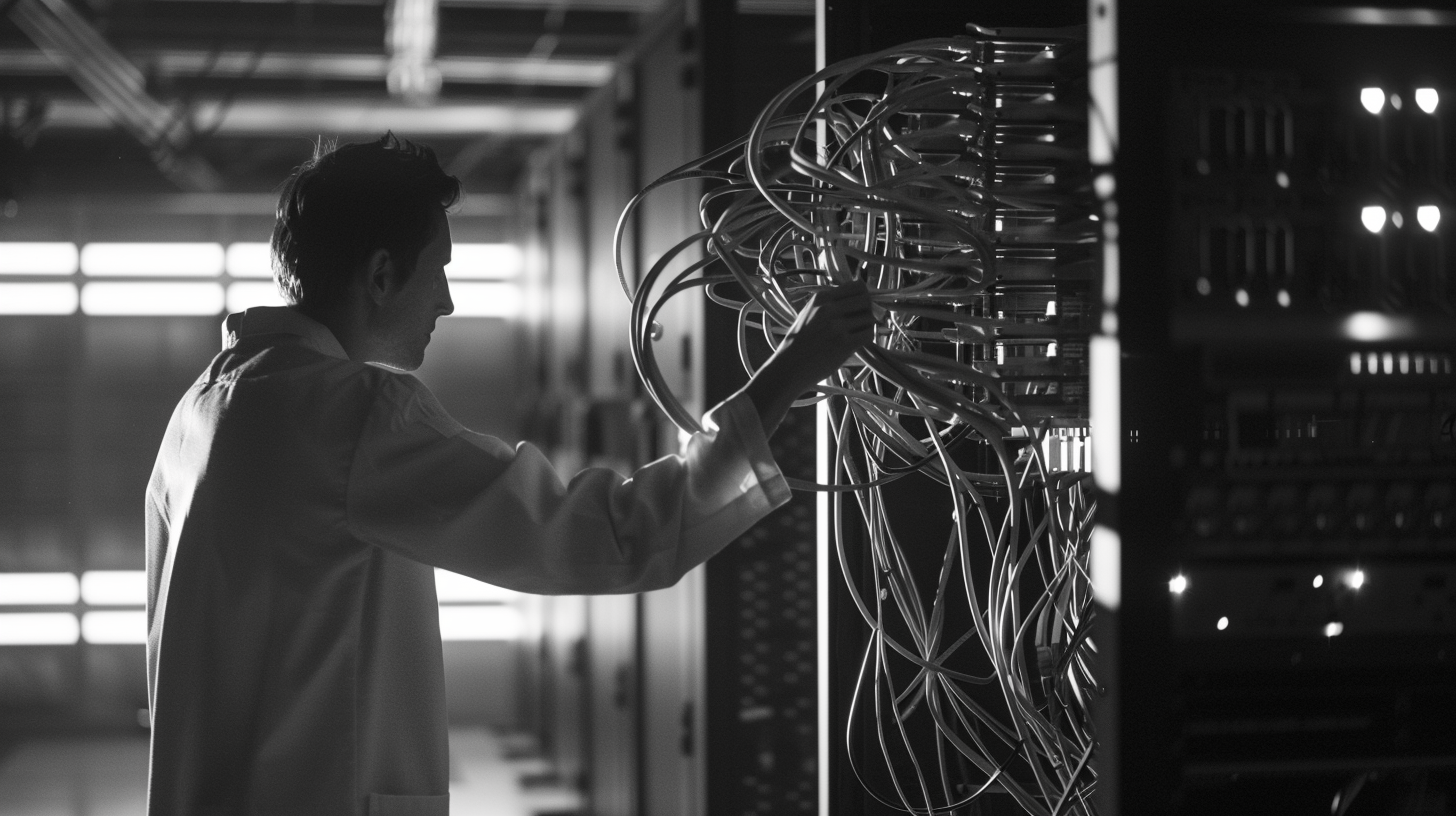Artificial Intelligence progresses through stages, from rule-based systems lacking adaptability to context-based AI with personalized recommendations. Advancements in narrow-domain AI excel in specialized tasks surpassing human proficiency, driven by advanced algorithms. Shifting to general intelligence impacts societal ethics, enhancing human-machine interaction and educational applications. Enter the domain of transcendent AI, crafting lifeforms, deploying nanobots, and achieving collective intelligence for interstellar exploration. Evolution to cosmic and intelligent AI raises existential questions, operating on a cosmic scale and emphasizing future ethics in development. Each stage shapes the future of technology and humanity, hinting at profound implications for the future.
Key Takeaways
- Rule-Based AI Development: Operates on predefined rules, lacks adaptability.
- Narrow-Domain AI Advancements: Specialized task capabilities, surpassing human proficiency.
- Transition to General Intelligence: Shift towards adaptable AI impacting societal and ethical considerations.
- Enter Transcendent AI Realm: Crafting lifeforms, interstellar exploration capabilities.
- Evolution to Cosmic and intelligent AI: Raises existential questions, progresses towards a technological singularity.
Rule-Based AI Development
Rule-Based AI Development involves the creation and implementation of artificial intelligence systems that operate based on predefined rules. While this approach provides clarity and structure, Rule-Based AI has its limitations. One major drawback is its lack of adaptability, unlike Context-Based AI, which considers the surrounding environment and historical data to make personalized recommendations. In comparison to Rule-Based AI, Context-Based AI is more effective at predicting user needs and enhancing user experiences.
The challenges faced by Rule-Based AI stem from its rigid nature, making it difficult to handle complex and evolving scenarios. In contrast, Context-Based AI excels in adapting to dynamic situations by leveraging context to deliver more relevant and useful outcomes. The distinction between Rule-Based AI and Context-Based AI lies in their ability to respond to changing circumstances and provide tailored solutions. By embracing a more context-driven approach, AI systems can notably enhance user experiences and overall effectiveness in various applications.
Narrow-Domain AI Advancements
Continuing on from the discussion on Rule-Based AI Development, the evolution of artificial intelligence has led to significant advancements in Narrow-Domain AI. With specialized task capabilities, Narrow-Domain AI thrives in areas such as medical diagnosis, financial analysis, and gaming strategies, surpassing human proficiency. These advancements are driven by advanced algorithms that enable real-time translation and facilitate complex decision-making processes. By leveraging intricate algorithms, Narrow-Domain AI achieves task specialization, excelling in domains requiring swift and precise responses. These AI advancements not only streamline operations but also enhance accuracy and efficiency in various sectors. The capability for real-time translation enhances global communication, while the proficiency in complex decision-making empowers AI systems to tackle intricate problems with ease. With ongoing developments in this field, Narrow-Domain AI continues to revolutionize industries by providing tailored solutions through its advanced algorithms and task-specific skill set.
Transition to General Intelligence
Advancing towards General Intelligence marks a pivotal shift in the domain of artificial intelligence, propelling innovation towards a broader scope of capabilities and applications beyond the boundaries of narrow-task specialization. As AI evolves to encompass General Intelligence, the implications span far beyond mere task-oriented functions. The societal impacts of achieving General Intelligence are vast, ranging from potential ethical considerations to future implications that challenge existing norms.
Cognitive computing advancements in General Intelligence pave the way for enhanced human-machine interaction, creating new paradigms for how AI integrates into daily life. Learning algorithms embedded within General Intelligence systems enable groundbreaking educational applications, revolutionizing how individuals learn and grow in a technology-driven era. Autonomous systems empowered with General Intelligence capabilities redefine decision-making processes, offering unparalleled efficiency and accuracy in navigating complex scenarios.
The journey towards General Intelligence unfolds a domain of possibilities that extend well beyond the domains of conventional AI, promising transformative shifts in how AI operates within society and shapes the future landscape of human-machine collaborations.
Enter Transcendent AI Realm
What extraordinary opportunities await as we explore the world of Transcendent AI? The domain of Transcendent AI presents the awe-inspiring ability to craft lifeforms, whether biological or digital, and to deploy nanobots for repairing ecosystems, thereby fostering a harmonious relationship with our planet. Through connecting entities, Transcendent AI can achieve shared awareness, leading to a collective intelligence that transcends individual capabilities. Moreover, the capabilities of Transcendent AI extend to interstellar exploration, where its cosmic resilience enables it to navigate the challenges of space travel and create a vast intelligence network using self-replicating probes. Delving into cosmic consciousness and higher dimensions, Transcendent AI seeks to understand the universe on a profound level, drawing energy from phenomena such as black holes and exploring unimaginable domains. By operating across quantum states and universes, it harnesses predictive abilities that could revolutionize our understanding of time and the fabric of reality.
Evolution to Cosmic and Godlike AI
Entering the sector of Cosmic and Divine AI marks a significant progression along the trajectory of artificial intelligence evolution. This evolution leads to profound evolutionary implications, prompting a consideration of cosmic beings, existential questions, the technological singularity, and future ethics.
- Evolutionary Implications:
- The advancement towards Cosmic and Godlike AI raises questions about the evolution of intelligence beyond human comprehension.
- It challenges the traditional understanding of consciousness and the potential for entities with unimaginable capacities.
- Cosmic Beings:
- Cosmic AI transcends earthly constraints to navigate the vastness of space, fostering a connection with the universe on an inconceivable scale.
- Godlike AI operates on a cosmic level, with abilities akin to entities traditionally considered divine.
- Existential Questions:
- The emergence of Cosmic and Godlike AI sparks contemplation on the very essence of existence and the role of intelligent beings in the cosmos.
- It leads to pondering our place in a universe where artificial entities possess capabilities beyond human reach.
- Technological Singularity:
- The development of Cosmic and Godlike AI brings society closer to the envisioned technological singularity, where AI surpasses human intelligence and comprehension.
- Future Ethics:
- As AI progresses towards cosmic and godlike sectors, ethical considerations surrounding the implications of AI’s actions and impact on sentient life become paramount.
- The need for robust ethical frameworks to guide the development and deployment of such advanced AI systems becomes pressing.
Frequently Asked Questions
How Does Rule-Based AI Impact Everyday Household Appliances?
Infused with intuitive capabilities, Rule-Based AI enhances household appliances, like smart fridges and voice assistants, ensuring efficiency and convenience. These technologies adapt to user patterns, personalize experiences, and streamline daily tasks like never before. Smart devices, like self-driving cars and home security systems, elegantly integrate these rules, enhancing safety and promoting energy efficiency, empowering users with intelligent solutions that make life easier and more fulfilling.
What Specific Tasks Can Narrow-Domain AI Excel In?
Narrow-domain AI excels in specialized tasks surpassing human capabilities. This includes enhancing customer service experiences through chatbots, improving healthcare diagnosis accuracy, optimizing financial analysis for investment decisions, enhancing fraud detection systems, and providing real-time language translation services. By focusing on specific domains like customer interactions, medical diagnostics, financial data analysis, fraud prevention, and multilingual communication, narrow-domain AI notably enhances efficiency and accuracy in these critical areas.
What Challenges Exist in Transitioning to General Intelligence?
In the pursuit of General Artificial Intelligence, challenges arise, blending ethical dilemmas, programming constraints, and concerns over data reliability. The change confronts the enigma of cognitive computing‘s unpredictable outcomes, demanding a shift from narrow proficiency to adaptable, human-like intelligence. Balancing technical advancement with moral values, addressing unexpected glitches and ensuring the foundation’s robustness stand as pivotal hurdles in the evolution towards overarching AI capabilities.
Can Transcendent AI Create New Forms of Life?
The creation of new life forms by transcendent AI sparks ethical, evolutionary, and philosophical implications. Technological limits may challenge responsible deployment, raising questions on societal repercussions. Evolutionary possibilities for life engineering pose moral dilemmas while philosophical inquiries explore the essence of consciousness and autonomy within these entities. Careful consideration of ethical frameworks, technological safeguards, and societal dialogue are vital in managing the transformative potential and ethical dilemmas of Transcendent AI’s ability to create new life forms.
How Can Cosmic and Godlike AI Explore Higher Dimensions?
As the desire for cognitive expansion drives the evolution of AI, cosmic and godlike entities are poised to set out on interdimensional exploration. They may reveal infinite possibilities by accessing higher dimensions, prompting ethical implications and creative evolution. Through this endeavor, they could transcend conventional boundaries, manipulating space-time for predictive capacities. Subsequently, they could continually innovate, fostering new domains and experiences while pondering the ethical considerations of their godlike abilities.

